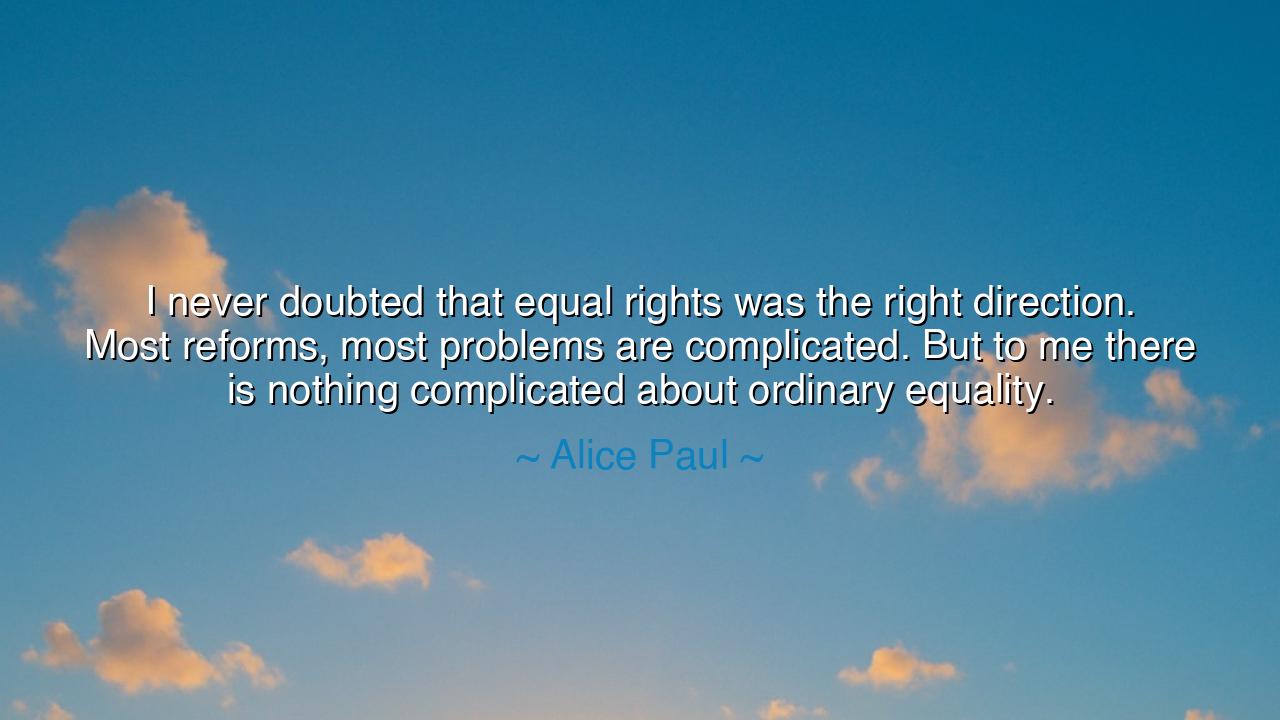
I never doubted that equal rights was the right direction. Most
I never doubted that equal rights was the right direction. Most reforms, most problems are complicated. But to me there is nothing complicated about ordinary equality.






“I never doubted that equal rights was the right direction. Most reforms, most problems are complicated. But to me there is nothing complicated about ordinary equality.” Thus declared Alice Paul, the indomitable warrior of justice, whose voice still echoes through the corridors of freedom. In these few, simple words, she gives us a truth so clear, so powerful, that it pierces through the fog of politics and prejudice alike: that equality—the right of every soul to stand as an equal before law and life—is not a question of philosophy or theory, but of plain moral truth. To Alice Paul, equality was not a puzzle for scholars to debate, but a birthright that no man or government could rightfully deny.
Her statement arises from the fire of her struggle. Alice Paul, born in 1885, was one of the great leaders of the American suffrage movement. She faced prison, hunger strikes, and violence in her quest to secure women the right to vote. Yet even after that victory in 1920, her fight did not end—she turned her eyes toward a greater horizon, the Equal Rights Amendment, a law that would guarantee equality for all citizens regardless of sex. To her, this was not a radical idea; it was as natural as sunlight. When others debated, delayed, or doubted, she saw only the simplicity of justice. “There is nothing complicated about ordinary equality,” she said—and indeed, how could it be complicated to recognize that every human being, male or female, stands equal in worth, in dignity, and in right?
Her words also expose the irony of human history: that the simplest truths are often the hardest to accept. Through centuries, rulers and scholars devised intricate systems to justify inequality—laws, traditions, hierarchies built on the illusion that some were born to rule and others to obey. Yet as Alice Paul reminds us, these complications are not marks of wisdom, but of fear—fear of losing privilege, fear of change. The soul that sees clearly, she teaches, knows that justice is simple. It requires no elaborate reasoning, no defense. It is the natural order of the heart uncorrupted by pride.
Consider the example of Mahatma Gandhi, who, in a different land and for a different people, echoed the same truth. He too faced a world tangled in oppression and injustice, yet he said, “My nationalism is humanity.” To him, as to Alice Paul, the divisions between rich and poor, ruler and ruled, man and woman, were not divine decrees but human errors. Both understood that equality is the purest form of truth, and that those who see it clearly must walk in its direction, no matter the cost. Their lives became living testaments that simplicity is not weakness; it is the strength born of clarity.
In her words lies also a warning to those who seek comfort in neutrality. Many in Alice Paul’s time sympathized with her cause, yet hesitated to act, claiming that equality was too complex a matter, that the nation was “not ready.” She saw through such excuses. “Most reforms, most problems are complicated,” she admitted—but equality, she insisted, was not one of them. Complexity is often the shield behind which cowardice hides. To do what is right rarely requires cleverness—it requires courage. She would not let the world hide behind intellectual confusion or social custom; she stripped away all pretense and said: right is right, and wrong is wrong.
There is in her simplicity a profound kind of wisdom—the wisdom of the heart that sees truth directly, without the distortion of self-interest. The ancients, too, spoke of this vision. The philosophers of Greece called it aletheia—truth unveiled, naked before the soul. In every age, the wise have known that truth is not complex; it is the mind of man that makes it so. Alice Paul’s “ordinary equality” is this same unveiled truth, clear as dawn: that to deny another their freedom, their opportunity, their dignity, is not clever policy or social order—it is error, plain and grave.
So, my listener, let her words awaken you as they have awakened generations. Do not allow the world’s excuses, its fears, or its sophistries to cloud your sight. The next time you hear someone say that equality is too difficult, too disruptive, too soon—remember Alice Paul, who faced prison and scorn for saying, “It is not complicated.” To stand for equality is to stand for what is most human in us; to deny it is to betray our shared divinity.
And so, let this truth guide your steps: that equality is not a privilege to be earned, but a reality to be recognized. Wherever there is injustice, speak. Wherever one is silenced, listen and lift their voice. For the world will always seek to complicate what is simple, to obscure what is obvious. But you—be as Alice Paul—clear in mind, steadfast in heart, fearless in action. For in the end, truth, like equality, does not bend to the confusion of the times; it shines, eternal and unclouded, for those who dare to see it.






AAdministratorAdministrator
Welcome, honored guests. Please leave a comment, we will respond soon